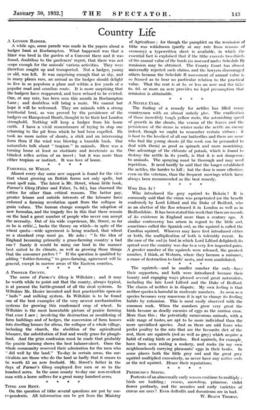FAREWELL TO WHEAT.
Almost every day some new support is found for the view that wheat growing on British farms not only spells, but must spell ruin. The latest is Mr. Street, whose little book, Farmer's Glory (Faber and Faber, 7s. 6d.), has charmed the critics for other than critical reasons. The better pay, greater leisure and outside interests of the labourer have enforced a farming revolution apart from the collapse in grain values. The human change compels the adoption of new formulas, and the tragedy lies in this that there remain OR the land a great number of people who never can accept the necessity. Out of his wide experience, Mr. Street, so far as he is eritid4 backs the theory on which—in spite of the wheat quota—wide agieement is being reached, that wheat as a standard crop must go. lie asks : " Is the idea of England becoming primarily a grass-farming country a had one ? Surely it would be using our land in the manner best suited to its climate, as well as growing those things that the consumer prefers ? " If the question is qualified by adding "fodder-farming" to grass-farming, agreement will be general, except in narrow areas of the Eastern counties.




































 Previous page
Previous page